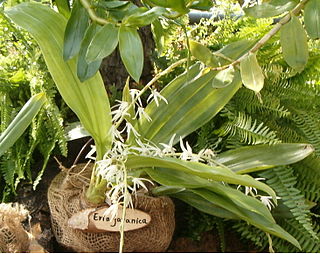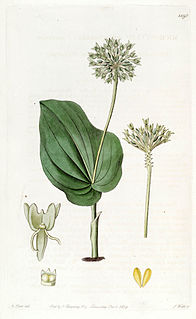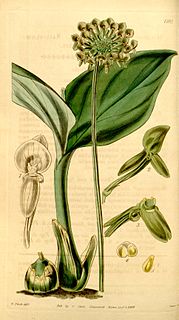
Discicristata is a proposed eukaryotic clade.
The Omoro Botanical Garden, also known as the Omoro Arboretum, is an arboretum and botanical garden located in the Ocean Expo Park, 424 Ishikawa, Motobu, Okinawa, Japan. It is open daily except Thursdays; admission is free.

Malaxis, commonly called adder's mouth, is a genus of terrestrial and semiepiphytic orchids. The generic name signifies "smooth" and alludes to the tender texture of the leaves. There are approximately 182 species, found mostly in tropics but with some species in temperate regions.

Eria is a genus of orchids with more than 50 species distributed in China, the Himalayas, the Indian Subcontinent, Southeast Asia, New Guinea, Polynesia, Melanesia and Micronesia.
Resupination is derived from the Latin word resupinus, meaning "bent back with the face upward" or "on the back". "Resupination" is the noun form of the adjective "resupine" which means "being upside-down, supine or facing upward".

Malaxis monophyllos, the white adder's mouth, is a terrestrial species of orchid. It is widespread across much of Europe, Asia, and much of southern Canada. In the United States, it grows mostly in southern Alaska, New England and the Great Lakes region, with isolated populations reported from Colorado and California.

Malaxis unifolia, or the green adder's-mouth orchid, is a species of orchid occurring from eastern and central Canada, the central and eastern United States, Mexico, Central America and the Greater Antilles.

Cryptostylis subulata, commonly known as the large tongue orchid, duckbill orchid or cow orchid, is a common and widespread orchid in south eastern Australia and New Zealand. It has relatively large, leathery, dark green to yellowish-green leaves and up to twenty yellowish flowers with a reddish-brown and dark purple labellum. It is often found in damp or swampy situations but also occurs in drier places.

Malaxidinae is an subtribe of orchids in the tribe Malaxideae of the subfamily Epidendroideae.
Malaxis bayardii, or Bayard's adder's-mouth orchid, is a species of orchid native to northeastern North America. It is found from Massachusetts to North Carolina, with isolated populations in Ohio and Nova Scotia. There are historical reports of the plant formerly growing in Vermont and New Jersey, but it seems to have been extirpated in those two states It grows in dry, open woods and pine barrens at elevations of less than 600 m.

Malaxis discolor is a species of orchid that is endemic to Sri Lanka.

Malaxis histionantha is a species of orchid native to Latin America. It is widespread from Mexico to Argentina. It generally has two leaves and a more or less spherical cluster of small green flowers.
Malaxis abieticola is a species of orchid native to Mexico and to the southwestern United States. It has only one leaf underneath several small green flowers growing in an elongated array.
Malaxis macrostachya is a species of orchid widespread across much Mexico, Central America, and the southwestern United States. It has only one leaf per plant, along with a tall flower stalk with as many as 160 tiny, green flowers.
Malaxis wendtii, the Wendt's adder's-mouth orchid, is a North American species of orchids native to northern Mexico and the US State of Texas.
Wurmiella is an extinct conodont genus.
Malaxis boninensis is a species of flowering plants in the family Orchidaceae, native to the Bonin Islands and the Volcano Islands, both belonging to Japan. It grows on the ground from pseudobulbs. It was first described by Gen-ichi Koidzumi in 1918, as Microstylis boninensis, and transferred to Malaxis by Kunio Nakajima in 1975.

Crepidium fimbriatum, commonly known as the fringed spur orchid, is a plant in the orchid family and is endemic to tropical Far North Queensland. It is an evergreen, terrestrial orchid with a fleshy stem, wavy leaves and many purple flowers crowded on a purple flowering stem.

Crepidium lawleri, commonly known as the small spur orchid, is a plant in the orchid family and is endemic to tropical far north Queensland. It is an evergreen, terrestrial orchid with an upright stem, dark green leaves and up to ten greenish cream-coloured flowers well spaced along a brittle flowering stem.

Crepidium marsupichilum, commonly known as the pouched spur orchid, is a plant in the orchid family and is endemic to tropical far north Queensland. It is an evergreen, terrestrial orchid with an cone-shaped stem, light green, shiny leaves and a large number of purple flowers crowded along a green and purple flowering stem.











